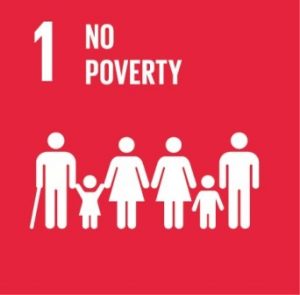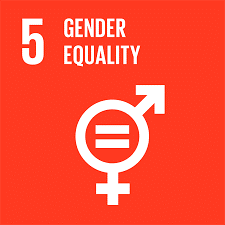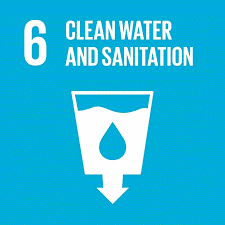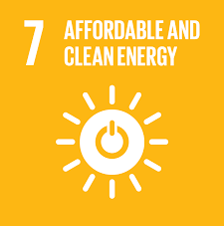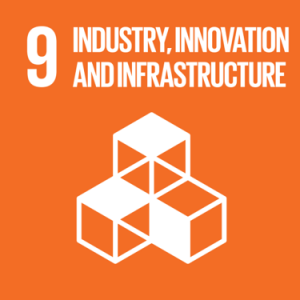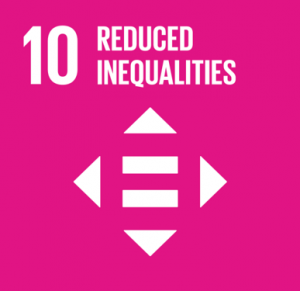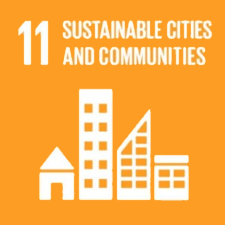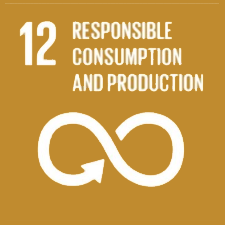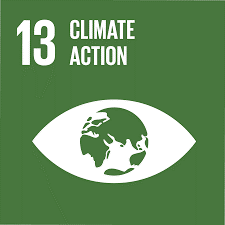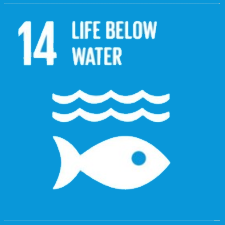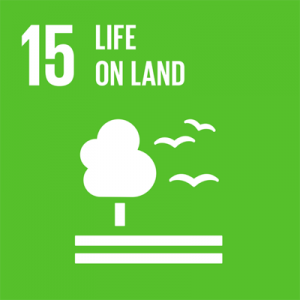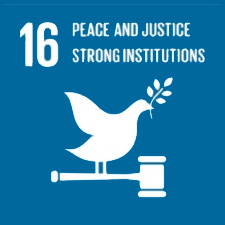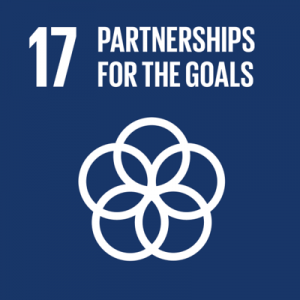SUSTAINABLE DEVELOPMENT GOALS
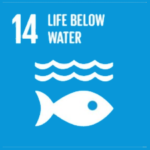
SDG 14: LIFE BELOW WATER
“The two SDGs that look at the broader ecosystem divide it into Life Below Water, and Life on Land. The oceans, and the rivers and watersheds that link to them, are the largest part of our ecosystem. 40% of the world’s population lives within 100km of the coast, and we all rely – directly or indirectly – on the sea.”
(THE Impact Rankings)
Supporting aquatic ecosystems through education
IPB University provides formal and informal educational programmes on freshwater ecosystems that are available for local and national communities.
Study Program of Aquatic Resource Management
IPB University has an aquatic resource management program that develops the science of managing aquatic resources (including fresh waters and marine waters) related to sustainability, conservation, aquatic ecosystems, and sustainable fisheries.
Summer Course “Tropical Aquatic Biodiversity and Management from Highland to Ocean (H2O)”
This is a summer course organized annually by the Department of Aquatic Resource Management. This year’s activity was held on July 26 – August 6 (for 11 days). There are 61 students participating in this summer course originating in 17 universities in 6 countries (Indonesia, Malaysia, Bangladesh, India, Philippines, and Japan), and 9 resource persons gave online lectures via zoom meeting.
Webinar on Sustainable Lake Governance
The Department of Aquatic Resource Management organized a webinar to discuss sustainable lake management to understand the phenomenon of mass fish deaths in Maninjau Lake. This webinar brings together various stakeholders and is open to the public.
Training on hydrological modelling in watershed management
This training is organized by IPB Training center, which aims to improve local capacity development on managing the watershed. It is paid training. The topics in this training include an introduction to the hydrological cycle, analysis of watershed management using GIS, and hydrological modelling using HEC HMS and SWAT applications. Online education programs aimed to educate the local & national communities on water management & conservation.
Hydrological Modelling Training (Case Study: Ciliwung-Cisadane Watershed)
Training on Smart Irrigation
IPB lecturers conduct training on smart irrigation in order to introduce irrigation innovation which can be adopted by the community. This innovation promotes water efficiency as well as cost effectiveness, which will give many benefits for the farmers.
CCRMS IPB University Campaigns for Conservation and Sustainable Utilization of Coastal and Ocean Resources for Students in Raja Ampat
The campaign is aimed to increase awareness of youth in Raja Ampat’s small islands. This is important because the young generation will be the future leaders and decide how the resources that’s known as the center of the world’s corals will be managed in the future.
Webinar on Indonesian Fisheries Management Zone
IPB University in collaboration with UNDP organized a webinar to enhance public awareness and knowledge about the Indonesian Fisheries Management Zone in order to achieve sustainable fisheries. This webinar opened to public.
Ocean Hydrobiology Training to Support Sustainable Marine Tourism
The Student Association of the Department of Marine Science and Technology organized training on ocean hydrobiology training to support sustainable marine tourism. This activity enhances knowledge and awareness of how to reduce ecological footprints through waste management, water usage management, etc.
Raising awareness about overfishing, IUU fishing and destructive fishing practices
An Alternative Way to Overcome IUU Fishing in Natuna
Dr Jonson Lumban Gaol, IPB University lecturer from the Department of Marine Science and Technology shares his views on the practice of illegal fishing (IUU fishing) in the Natuna by the foreign fishermen. According to him, there are three things that Indonesians need to do to reduce the theft of marine resources in Natuna, namely continuous monitoring and supervision of foreign fishing vessels sailing in Indonesian waters by various methods, such as unconventional methods with satellite technology; strengthening the surveillance system for fishing vessels in Indonesian waters by integrating existing technology, and developing fishing fleets or vessels, especially for Indonesian fishermen at national borders, so fishermen can optimally use our marine resources.
Public discussion on potential economic impacts of IUU Fishing in Indonesia
Dr. Lucky Adrianto, an IPB University Experts, discussed the potential economic impact of IUU Fishing together with other reviewers from the RPOA-IUU Secretaria. In this forum reviewers and participants discuss several methodological elements to overcome IUU fishing, including utilising data from overlayed satellite imagery and VMS, integrating vessels’ operational criteria and underscoring the unreported and unregulated fishing aspects within Fisheries Management Area 718.
Supporting aquatic ecosystems through action
IPB University has a faculty and two research centers which focus areas of activities related to aquatic ecosystem conservation and sustainability. To promote conservation and sustainable use of, various events have been implemented by IPB University in collaboration with some partners.
Workshop on Marine Debris
IPB University in collaboration with the World Bank organized the workshop “Joint Movement to Reduce Plastic Waste for a Healthy Indonesian Sea” to increase public awareness on marine conservation.
Reduce Plastic Waste for Healthy Indonesian Sea
Mangrove and seagrass planting, and coral transplantation
CCRMS IPB collaborates with the local community in Raja Ampat to conduct some activities, including mangrove and seagrass plantation and coral transplantation to promote conservation of marine ecosystems in that area. These ecosystems are very important for the economy of local communities from tourism activities.
Mangrove and Seagrass Planting and Coral Transplantation
School of coral reef restoration
Department of Marine Science organizes an educational program, called School of Coral Reef Restoration, which aims at promoting an increase in hard coral cover, the three-dimensional structure of coral reefs and fish populations. The program is conducted in form of weekly webinar series.
School of Coral Reef Restoration
Webinar on the development of remote sensing technology in Marine Seas
IPB University in collaboration with University of Papua organized a webinar on the development of remote sensing technology in the marine sector to promote the conservation of marine habitats and marine waters through the database gathered using this technology.
Webinar on the development of remote sensing technology in Marine Seas
Greenbelt conservation to conserve aquatic ecosystem
Student association of Department of Water Resources Management conduct planting and monitoring mangroves to conserve greenbelt area which is important for the quality of marine ecosystem. This activity aims to determine the growth and condition of mangroves from the plantings that have been carried out in 2019 and 2020. On the same occasion we also replanted 1,000 mangrove seedlings of the Bruguiera cylindrica type in Patramangala Village. With this method, the general public can participate in efforts to protect and improve coastal areas by adopting mangrove seedlings.
Greenbelt Conservation in Marine Ecosystem
Studies Research Plastic Waste in Citarum River
PPLH IPB in collaboration with Norwegian Institute for Water Research conduct a study on plastic waste in order to provide data on marine debris and to provide input to solve marine debris problems. The study was conducted along the river basin area of Citarum.
IPB ensures that food on campus must be supplied from sustiainable-managed aquatic ecosystems and sustainably harvested as mandated in the Rector’s Regulation No 133/2020 about IPB commitments on the implementation of SDGs (point j page 2) .
Commitment on Achieving SDGs (food on campus sustainably harvested)
Sustainable Purchasing Guidelines in IPB University
Objectives
IPB University is committed to advancing sustainability on campus, in the community, and globally. This guidelines aims to create guidelines for the procurement of products and services that support the university’s commitment to sustainability.
Applicability
All university agency organisations and all contracted and subcontracted services shall adhere to these guidelines. The requirements herein shall be written into all Requests for Proposals, contracts, sponsorship agreements, and strategic alliance agreements that pertain to procurement of products or services. Any variances shall be approved in writing by the Director of Business, IPB University.
Guidelines
To make sure the quality of food source, all university agency organisation and all contracted and subcontracted services must:
- Provide local and or community-based products and healthy and nutritional foods.
- Maintain food health and hygiene, environmental hygiene, and the beauty, order, and preservation of garden facilities and public facilities in the environment around the Canteen
- Assess and monitor the ethics behind the seafood the University serve and telling the University suppliers to remove endangered species from menus and catering
- Maintain the canteen environment by paying attention to the level of hygiene, cleanliness, health, and halal of food
- Maintain the quality of food and the cleanliness of utensils and equipment used in providing food
comply with and implement food quality requirements and minimum service standards

IPB university works directly to maintain and expand existing ecosystems and their biodiversity, both plants and animals, especially threatened ecosystems.
In 2021, IPB Laboratory of Biodiversity and Marine Biotechnology and Diving School in the Department of Marine Science works together with Asahimas Co.Ltd, KEHATI Foundation, Terangi Foundation, Maritim Muda Nusantara, West Java Conservation Agency (BKSDA), Oceanogen Environmental and Biotechnoogy Laboklinikum to rehabilitate marine ecosystems in Sangiang Island. The team carried out transplantation of coral reefs as well as monitoring the waters through the collection of ecological data, as well as taking water samples for environmental DNA (eDNA) analysis to determine the biodiversity in the waters of Sangiang Island.
IPB University’s Center for Coastal and Marine Resources Studies (PKSPL) partnering with Husky-CNOOC Madura Limited (HCML) and the Mandangin Island community carried out the rehabilitation of coral reef ecosystems in Mandangin Island, Sampang, Madura.
PKSPL IPB University Planting Mangroves, Seagrasses and Transplanting Corals with the Coastal Ecosystem Management Group in Yensawai Village, Raja Ampat
Rehabilitation of Mangrove, Seagrass, and Coral in Yensawai, West Papua
IPB University Donate FADs for Fisherman
IPB University handed over three portable FADs to fishing lines and purse seine fishers in Bandar Lampung City. This assistance was used as a trial material for using portable FADs from IPB University innovations by fishers in Lampung Province. This FADs is given to fishermen to campaign sustainable fisheries practices by avoiding destructive fishing (ecosystem damage prevention).
FADs for Fisherman – Campaign on Sustainable Fisheries Practices
IPB University’s TREKFish Technology Has Been Used by Crab Fishermen in Several Areas
Researchers at the Faculty of Fisheries and Marine Sciences (FPIK) IPB University succeeded in developing TREKFish technology. A tool used to track fishing trails (fish, crab, lobster and others) equipped with fishER™ software (Fisheries Electronic Reporting). The research team consisting of Prof. Indra Jaya, Dr. Hawis Madduppa and Muhammad Iqbal, SPi, MSi saw that the high demand for crab meat processing had an impact on increasing the intensity of crab catching. This causes the current crab population to experience overfishing and critical, so it needs to be managed.
Water sensitive waste disposal
The Directorate of Infrastructure and Campus Environment Security – IPB University release a Standard Operating Procedure for Wastewater Management that adopts water quality standards and guidelines for water discharges released by the Indonesian Ministry of Forestry and Environment Regulation No: P.68/Menlhk/Setjen/Kum.1/8/2016 concerning Domestic Wastewater Quality Standards.
The direction to protect the environment, including implementing wastewater management, has been stiphlated in the Rector’s Decree No 133/2020 (point s page 2) concerning commitment of IPB in achieving Sustainable Development Goals.
Academic Paper of Planning of Green Campus Implementation 2019 – 2023 also describes guidelines to the compliance of all national and international water quality standards as stipulated at Chapter 4, Sub-Chapter 4.1. (Page 47-48) and Chapter 5.8 (page 94) and Chapter 6.7 (Page 123).
Circular Letter Refers to Reducing Waste of Plastic, Pepper, and Styrofoam
Implemented in the form of appeal to reduce the use of plastic bags, bottled drinking water, Styrofoam and paper, which aim for reducing impacts of land-based activities on marine. We also issued a circular letter in 2021 regarding
- Healthy and Sustainable Lifestyle to prevent waste in sea and river in Circular Letter No. 24714/IT3/HM/M/2021 (Page 2 Point 3).
- Waste management to reduce river and sea pollution in letter no. 22015 /lT3/KP/2021 (Points 5-7).
Circular Letter about Healthy and Sustainable Lifestyle in 2021 (Action to Reduce Plastic Waste)
Circular Letter about Waste Management (Action to Reducing Plastic Waste)
Circular Letter released in 2019 regarding action to reduce plastic waste
Circular Letter on Reducing Plastic Waste (10536/IT3/PP/2019)
Circular Letter on Appeal for Waste Sortation (12905/IT3/TU/2019)
Circular Letter on Appeal for Reducing Paper Waste (17960/IT3/TU/2019)
The plan to reduce the volume of plastic waste is also part of green movement initiated by IPB, which stated in the Academic Paper of Green Campus Planning and Implementation (Page 71).
Green Campus Academic Paper (Long Term Plan in Reducing Plastic Waste)
Commitment on Achieving Sustainable Development Goals in Rectors Decree No. 133/IT3/LK/2020 including:
- apply the principles of reuse and recycle in the use of resources
- prevent pollution of rivers and seas
- hazardous waste treatment
- reduce plastic waste
Commitment on Achieving SDGs (Action to Reducing Plastic Waste)
Green Movement
The Green Movement consists of five collaborative movements to realize the IPB Green Campus 2020. The five collaborative movements are (1) Healthy Canteen Ecolabelling, (2) Procurement of Tumblers and Ecobags (Go-Teco), (3) Plastic Elimination Policy on Campus ( Caring for Environment), (4) Standardization of Trash Cans, and (5) Thematic Day (#Hayu Atuh Movement).
Read full article:
Hygiene Procedures and Restrictions on the Use of Plastic
The Cleanliness and Restriction of Plastic Use Procedures aim to provide guidance in the environmental hygiene aspects of PKSPL-IPB as well as restrictions on the use of plastic in office activities. This procedure covers aspects of equipment, cleanliness and restrictions on the use of plastic in PKSPL IPB activities.
SOP Hygiene Procedure and Restriction of Plastic Use in PKSPL IPB University
Policy on Preventing and Reducing Marine Pollution
Over the past year, IPB staff and students have continued to work extensively to develop strategies to deal with plastics pollution. Our contributions have started to generate action at the political level, including a commitment from the local government of Bogor to ban harmful single-use plastics as early as 2018.
Our university has policies on the preventing damage to aquatic ecosystems (e.g. river, marine, seagrass ecosystems, coral reefs, mangroves) as stated in the Rector Decree no 133/IT3/LK/2020 point L
This is the strengthening of previous policy on reducing plastic waste that has been stipulated in the Academic Paper of Green Campus Planning 2019-2023
Implemented in the form of appeal to reduce the use of plastic bags, bottled drinking water, Styrofoam and paper, which aim for reducing impacts of land-based activities on marine. We also issued a circular letter ragarding
- Healthy and Sustainable Lifestyle to prevent waste in sea and river in Circular Letter No. 24714/IT3/HM/M/2021 (Page 2 Point 3).
- Waste management to reduce river and sea pollution in letter no. 22015 /lT3/KP/2021 (Points 5-7).
Circular Letter about Healthy and Sustainable Lifestyle (Reducing Marine Pollution)
Circular Letter about Waste Management (Reducing Marine Polution)
At the lower level, department or research center applies this policy, such what has been implemented by CCRMS-IPB, which set Standard Procedure for Cleaning and Plastic Reduction in its area of working.
Hygiene Procedures and Restrictions on the Use of Plastics in CCMRS IPB University
Maintaining a local ecosystem
IPB has a plan to minimise physical, chemical and/or biological alteration of related aquatic ecosystem. This plan are integrated in Green Campus Initiatives movement and was mentioned in Green Campus Academic Paper. Minimizing Alteration of Aquatic Ecosystem especially mentioned in Chapter 4, Sub-Chapter 4.3. (Page 51); Chapter 5.4 (Page 77) & Chapter 6.3 (Page 112). (Ev 1a and 1b). The Green Campus Team of IPB University is an ongoing and forthcoming study in the campus’ existing operational activities to be annually held in compliance with current regulations in Indonesia.
It is implemented based on the Standard Operational Procedures on Hazardous Waste Treatment supervised by the Directorate of General Affairs.
IPB collaborates with third parties to manage these hazardous waste
The PPLH IPB team carried out monitoring of sites/reservoirs in DKI Jakarta
The PPLH IPB team carried out monitoring of sites/reservoirs in DKI Jakarta which were included in the management priority category. The lakes/reservoirs that are the focus of this review are Situ Rawa Badung and Situ Customs which are adjacent to residential areas. For comparison, the team also monitored Situ Rawa Gelam which is included in the management area of the Pulo Gadung Industrial Estate (Jakarta Industrial Estate Pulogadung-JIEP).
From the results of this monitoring, the team identified the types of pollutant sources that might enter the water body, visually observed the condition of the in situ water body and the location of waste generation around the lake/reservoir which has the potential to pollute the aquatic environment. The presence of waste generation entering the reservoir/reservoir accelerates the process of silting up, clogging the inlet and outlet water channels.
PPLH IPB Berikan Alternatif Pengelolaan Situ/Waduk di DKI Jakarta
Wastewater Disposal Standard to Minimize Alteration of Aquatic Ecosystem
IPB University has fulfilled wastewater disposal standard based on ISO/IEC 17025 (General requirements for the competence of testing & calibration laboratories). Several laboratories of IPB have received ISO/IEC 17025 certification.
IPB University has monitor the health of aquatic ecosystems through several activities:
PPLH IPB University monitors river ecosystem in Jakarta
IPB University through PPLH monitors the health of river water ecosystems in 5 rivers in DKI Jakarta. The monitoring locations cover five administrative areas, namely East Jakarta, South Jakarta, West Jakarta, North Jakarta, and Central Jakarta, which are traversed by five watersheds, namely Ciliwung , Sunter , Angke-Pesanggarahan , Cakung , and Sentiong. Monitoring activities were carried out at 120 monitoring points in 23 river networks namely Ciliwung River, Cipinang, Angke, Sekertaris, Sepak, Mookervart, Grogol, Sunter, Krukut, Cengkareng, Buaran, Petukangan, Jati Kramat, West Kalibaru, East Kalibaru, East Canal, Cakung , Cideng, Mampang, West Tarum, Kamal, Pesanggrahan, and Blencong. DKI Jakarta Province is traversed by several rivers that empties into Jakarta Bay, this system is partly upstream in West Java Province and Banten Province.
Sampling zooplanktons to monitor the health of aquatic ecosystem of Jakarta Bay
A doctoral student under the supervision of Dr. Hawis Madduppa conduct a research on zooplankton in Jakarta Bay as part of an expedition that are taken place at several places in Indonesia.
Expedition at Sebesi Island
Fisheries Diving Club IPB University once again held the Zooxanthellae expedition. Zooxanthellae Expedition is an expedition activity to study aquatic ecology and socio-economics in the community. On this occasion, the Zooxanthellae expedition was carried out on Sebesi Island, West Lampung.
Monitoring the Health of Aquatic Ecosystems in Sebesi Island
Bio-Monitoring in Aquatic Organism
Dr. Hawis presents data collection tool using eDNA next generation biomonitoring. He has applied the eDNA barcoding to monitor the biology and evaluation of aquatic ecosystems, particularly isolated coral reefs. It is a modern tool recommended as an alternative or complementary method to the conventional visual survey, as long as field requirements allow for lower visibility and less strict taxonomy competence.
eDNA Next Generation Biomonitoring for Data Collection of Indonesian Biodiversity
PPLH IPB conducts a study on plastic waste in Citarum River
To monitor the health of the river ecosystem, PPLH conducted a study to measure contribution of pollution into Citarum River.
IPB University has supported ad-hoc and on-going programs and incentives that encourage and maintain good aquatic stewardship practices.
Mangrove and seagrass planting, and coral transplantation
CCRMS IPB collaborates with the local community in Raja Ampat to conduct some activities, including mangrove and seagrass plantation and coral transplantation to promote conservation of marine ecosystems in that area. These ecosystems are very important for the economy of local communities from tourism activities.
Waste cleaning in Pramuka Island Waters
IPB collaborates with several NGOs and the local community to take action to clean the marine waters in Pramuka Island. This activity aims to increase public awareness and stewardship of the marine ecosystem.
IPB University’s Alumni Association Plants 5.000 Mangrove Trees in Tangerang
The Alumni Association of IPB University (HA IPB) has donated 5000 mangrove seeds and a number of rare trees to be planted in the coastal area. This activity is organized by the National Movement for the Conservation of Rare Indonesian Trees. The Central Management Board of HA IPB has worked together with SEAMEO BIOTROP, the Center for Coastal and Marine Resources, and the Regional Committee of HA IPB Banten for this movement of planting mangrove trees and coastal vegetation in the region of Tangerang.
IPB Student Community Service (KKN): Planting Mangrove Trees to Prevent Abrasion in Bedono Village
IPB Students conducted mangrove ecosystem stewardship practices in Bedono Village to prevent abrasion in the coastal area. This program was held on 26 July 2021.
Green Belt Conservation 2021: Mangrove Restoration Program in Patramanggala Village
Student association of Department of Water Resources Management conduct planting and monitoring mangroves to conserve greenbelt area which is important for the quality of marine ecosystem. This activity aims to determine the growth and condition of mangroves from the plantings that have been carried out in 2019 and 2020. On the same occasion we also replanted 1,000 mangrove seedlings of the Bruguiera cylindrica type in Patramangala Village. With this method, the general public can participate in efforts to protect and improve coastal areas by adopting mangrove seedlings.
PKSPL IPB University Forms a Coastal Ecosystem Conservation Group in West Yensawai Village
IPB cooperated with local community groups of fishermen in Yensawai Barat to maintain coastal ecosystem in Papua. The local fishermen were involved & engaged in a sustainable & environmentally aquaculture practices in the project area.
PKSPL IPB University collaborate with locals in Yensawai – West Papua to mantain shared ecosystem
PKSPL IPB University Jaga Ekosistem Terumbu Karang bersama Masyarakat dan Husky CNOOC
IPB University’s Center for Coastal and Marine Resources Studies (PKSPL), Husky-CNOOC Madura Limited (HCML) and the Mandangin Island community initiated the rehabilitation of coral reef ecosystems. This activity began with the laying of the transplant module around Candin Beach.
Collboration in Coral Transplantation (shared ecosystem) in Mandangin Island – Madura
IPB University has implemented a watershed management strategy trough some activities:
Develop Lake and Water Quality in Jakarta (Watershed Management)
PPLH IPB in cooperation with the government of Jakarta Province conducted study which was aimed to develop river & lake water quality standard in the Jakarta province area in 2021. One of the important output was the description of the river & lake water quality standard, the major polluted water quality parameters & the priority location related to the critical condition.
PKSPL IPB University Monitors on Environmental Quality of Eastuary Area in Bengawan Solo River
PKSPL IPB University monitors environmental quality, flora, and fauna in Ujung Pangkah, East Gresik. The Ujung Pangkah area is an estuary area of the Bengawan Solo River. Its existence has become very important for the coastal life support system. The government has designated this area as one of the Mangrove Essential Ecosystem Areas through the Minister of Forestry Letter No. S.729/Menhut – IV/2012 and complemented by the Decree of the Governor of East Java No. 188/309/KPTS/013/2020. This site is an Internationally designated location as a wetland habitat of Global importance. This area is a habitat for various aquatic and terrestrial biota, a migration area for migratory birds (especially Pelicans), and a location for livelihoods such as fishermen or fish farmers. This monitoring was routinely carried out every year, and in 2021 it conducted for about one week (1-7 November 2021). This monitoring aimed at the quality of the physical environment (such as air, sedimentation, and air), the quality of flora and fauna, and the social and economic conditions of the community.
Monitoring and Management Strategy on Estuary Area – Bengawan Solo River
RELATED NEWS
It seems we can't find what you're looking for.

